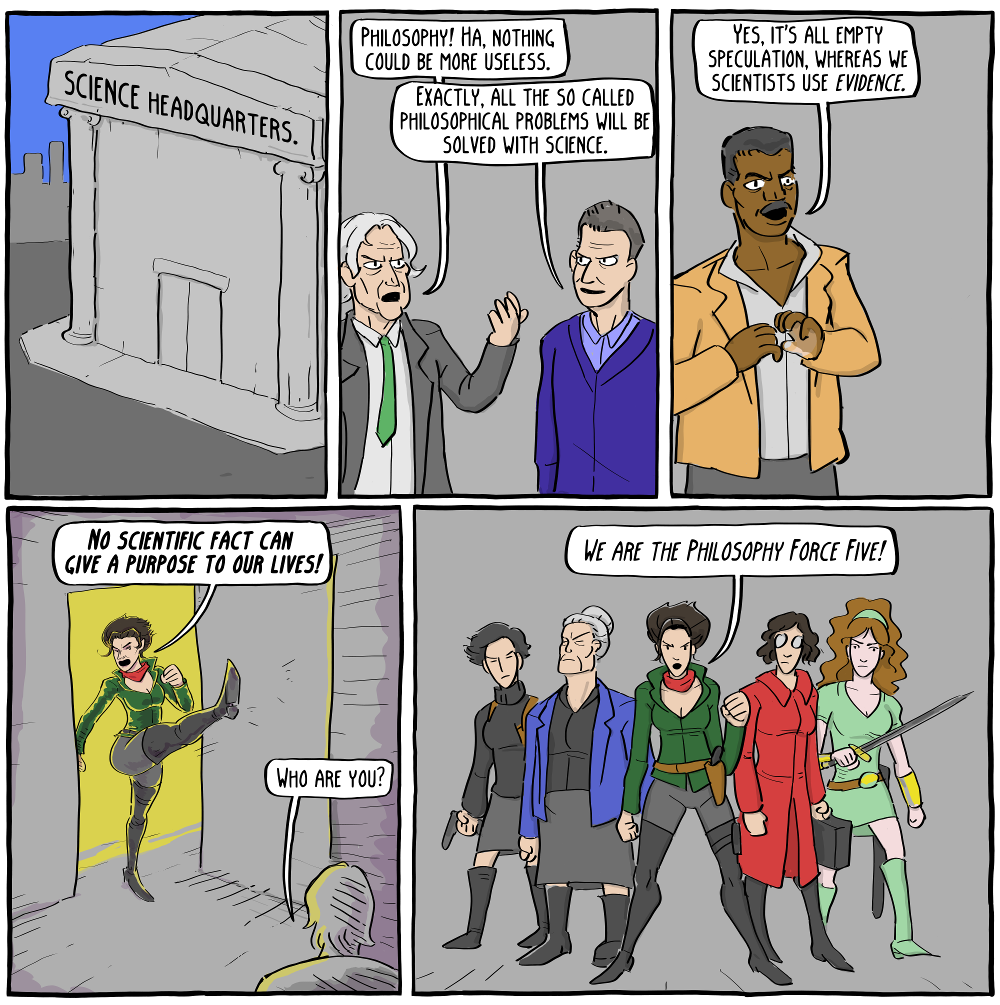Existential Comics is… a bit of a weird read. Crudely drawn, a bit obsessed with nihilism, it nonetheless hits some very powerful notes. And in their latest comic, they struck a chord close to home.
 Confession time: not too long ago, I probably would have been standing next to Science Headquarters. I never would have called philosophy useless, and I thought Harris in particular was underplaying how difficult it would be to create a moral system from science, but I did buy into things like this.
Confession time: not too long ago, I probably would have been standing next to Science Headquarters. I never would have called philosophy useless, and I thought Harris in particular was underplaying how difficult it would be to create a moral system from science, but I did buy into things like this.
Science is the best method humankind has devised for understanding causality. Therefore the scientific method is our most effective tool for understanding the causes of the effects we are confronted with in our personal lives as well as in nature. There are few human traits that most observers would call truly universal. Most would consent, however, that survival of the species as a whole, and the achievement of greater happiness of individuals in particular, are universals that most humans seek. We have seen the interrelationship between science, rationality, and rational skepticism. Thus, we may go so far as to say that the survival of the human species and the attainment of greater happiness for individuals depend on the ability to think scientifically, rationally, and skeptically.
In the handful of years since then, I’ve realized that science is both a business and a career. That alone is enough to warp the scientific record and induce false results. But the rot extends even further, right into the scientific method itself, and the only way out is through philosophy. If you’d prefer the short version (emphasis mine):
The above derivation is one reason why the frequentist confidence interval and the Bayesian credible region are so often confused. In many simple problems, they correspond exactly. But we must be clear that even though the two are numerically equivalent, their interpretation is very different.
Recall that in Bayesianism, the probability distributions reflect our degree of belief. So when we computed the credible region above, it’s equivalent to saying
“Given our observed data, there is a 95% probability that the true value of μ falls within CRμ” – Bayesians
In frequentism, on the other hand, μ is considered a fixed value and the data (and all quantities derived from the data, including the bounds of the confidence interval) are random variables. So the frequentist confidence interval is equivalent to saying
“There is a 95% probability that when I compute CIμ from data of this sort, the true mean will fall within CIμ.” – Frequentists
Note the difference: the Bayesian solution is a statement of probability about the parameter value given fixed bounds. The frequentist solution is a probability about the bounds given a fixed parameter value. This follows directly from the philosophical definitions of probability that the two approaches are based on.
So while many in the atheo-skeptic sphere are singing the praises of science, I’m filled with existential dread from things like this.
That question has been central to [John] Ioannidis’s career. He’s what’s known as a meta-researcher, and he’s become one of the world’s foremost experts on the credibility of medical research. He and his team have shown, again and again, and in many different ways, that much of what biomedical researchers conclude in published studies—conclusions that doctors keep in mind when they prescribe antibiotics or blood-pressure medication, or when they advise us to consume more fiber or less meat, or when they recommend surgery for heart disease or back pain—is misleading, exaggerated, and often flat-out wrong. He charges that as much as 90 percent of the published medical information that doctors rely on is flawed. His work has been widely accepted by the medical community; it has been published in the field’s top journals, where it is heavily cited; and he is a big draw at conferences. Given this exposure, and the fact that his work broadly targets everyone else’s work in medicine, as well as everything that physicians do and all the health advice we get, Ioannidis may be one of the most influential scientists alive. Yet for all his influence, he worries that the field of medical research is so pervasively flawed, and so riddled with conflicts of interest, that it might be chronically resistant to change—or even to publicly admitting that there’s a problem.
Come to think, that could explain why I read the comics I do.
